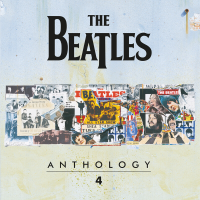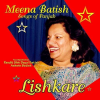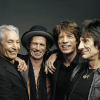Home » Jazz Musicians » The Beatles
The Beatles
Nickname: The Fab Four
The Beatles are the greatest popular group of all-time. Arguably the most successful entertainers of the 20th century, they contributed to music, film, literature, art, and fashion, made a continuous impact on popular culture and the lifestyle of several generations. Their songs and images carrying powerful ideas of love, peace, help, and imagination evoked creativity and liberation that outperformed the rusty Soviet propaganda and contributed to breaking walls in the minds of millions, thus making impact on human history.
In July of 1957, in Liverpool, Paul McCartney met John Lennon and joined his group, The Quarrymen. George Harrison joined them in February of 1958. In 1959 they played regular gigs at a club called The Casbah. They were joined by vocalist Stuart Sutcliffe, and by drummer Peter Best, whose mother owned The Casbah club. Early incarnations of the band included The Quarrymen, Johnny & the Moon Dogs, and The Silver Beetles. John Lennon dreamed up the band's final name, The Beatles, a mix of beat with beetle. In 1960 The Beatles toured in Hamburg, Germany. There they were hired by singer Tony Sheridan as a backing band for his recordings for the German Polydor label. During the year of 1961 they played regular gigs at the Cavern club and were looking for a new manager. By the mutual decision of the Beatles' members, their first manager, named Allan Williams, was replaced.
Brian Epstein was invited to be the manager of the Beatles in November 1961. His diplomatic way of dealing with the Beatles and with their previous manager resulted in a December 10, 1961, meeting, where it was decided that Epstein would manage the band. A 5-year management contract was signed by four members at then-drummer Pete Best's home on January 24, 1962. Epstein did not put his signature on it, giving the musicians the freedom of choice. At that time McCartney and Harrison were under 21, so the paper wasn't technically legal. None of them realized this and it did not matter to them. What mattered was their genuine trust in Epstein. He changed their early image for the good. Brian Epstein made them wear suits and ties, classic shoes, and newer haircuts. They were advised to update their manners on stage and quit eating and drinking in public. Brian Epstein worked hard on both the Beatles' image and public relations. He improved their image enough to make them accepted by the conservative media of their time. Most if not all of their communication off-stage was managed by Brian Epstein.
Read moreTags
The Beatles Anthology (25th Anniversary Reissue)

by Doug Collette
The Beatles Anthology 25th Anniversary Reissue The Beatles 368 Pages ISBN: # 978-1797241487 Chronicle Books 2025 Reprinted to commemorate the quarter-century since its first publication, the 2025 edition of The Beatles Anthology (25th Anniversary Reissue) book is little different from its now hard-to-find predecessor, except in the most cosmetic sense(s). Without any notation of its distinction, this milestone edition has an outer graphic design matching that of the audio companion piece ...
Continue ReadingThe Beatles: Anthology 4

by Doug Collette
The Anthology Collection is a box set of music by the Beatles, released on CD as well as vinyl to commemorate the 30th anniversary of the original broadcast of the video documentary The Beatles Anthology. In addition to remastered versions of the previous collections--each of which focuses on a designated period of the iconic band's history--the comprehensive set now features Anthology 4, a 36-track microcosm of the Liverpudlians' canon, thirteen selections from which have never been released before.
Continue ReadingJohn & Paul: A Love Story in Songs

by Doug Collette
John & Paul: A Love Story In Songs Ian Leslie 448 Pages ISBN: # 9781250869548 Celadon Books 2025 Considering the reams of research and writing devoted to the Beatles since their monumental success in the early '60s, it seems almost implausible any writer could find a fresh perspective on the British group and their work. But Ian Leslie has done just that with John & Paul: A Love Story In Songs.
Continue ReadingInterpreting the Lennon / McCartney Songbook, part 4: Abbey Road & Let It Be

by Larry Slater
In this final installment of interpretations of the John Lennon and Paul McCartney songbook, we turn to music from the last few Beatles albums... The White Album, Abbey Road and Let it Be. By the end of the '60s, the Lennon/McCartney partnership had fractured beyond repair; McCartney's superior musical skills were respected but resented by the rest of the band, who complained about his micromanagement. Lennon was addicted to heroin and he later admitted, “I was stoned all ...
Continue ReadingInterpreting the Lennon/McCartney Songbook, Part 3: Sgt. Pepper

by Larry Slater
It's really no surprise that the tunes from The Beatles still attract jazz musicians, much as the music of Gershwin, Kern or Cole Porter does. Sgt Pepper's Lonely Hearts Club was a defining musical moment of the 1960s. Released in 1967, the album is one of a kind and included songs that have appealed to jazz artists: “She's Leaving Home," “Lucy In the Sky With Diamonds," “With A Little Help From My Friends" and “A Day In The Life." Featured ...
Continue ReadingInterpreting the Lennon/ McCartney Songbook: Part 2, Rubber Soul and Revolver

by Larry Slater
The songwriting team of John Lennon and Paul McCartney became increasingly sophisticated by the mid 1960s. McCartney was the more knowledgeable musically, as he played piano and understood harmony (though he never did learn to read music). Much of John Lennon's writing had a harder edge, and he had a way with lyrics. The albums Rubber Soul and Revolver included some timeless songs that have inspired jazz musicians to interpret them as vehicles for improvisation. “Yesterday," “Here, There and Everywhere," ...
Continue ReadingInterpreting The Lennon/Mccartney Songbook: Part 1, Early Songs

by Larry Slater
Since its earliest days, Jazz musicians have used popular songs as springboards for creative interpretation, reimagining these tunes through the art of improvisation.. The great American songbooks of Irving Berlin, Cole Porter, and George Gershwin, have long been a staple of the jazz repertoire. Do John Lennon and Paul McCartney belong in this exalted company? I think they do, and there has been a renewed interest among jazz musicians, with recent Beatles cover albums by Americans and Europeans alike.
Continue ReadingThe Beatles: 'Revolver' Reissue

Source:
JazzWax by Marc Myers
Revolver was recorded between April and June in 1966 and released that August 5th. I was 9 when Revolver came out but the album never wound up in my hands. I'm not sure why. The omission might have had to do with my gift-giving extended family's disapproval of an album named for a gun. Or maybe it was because I was in day camp that July. Or perhaps it was the confusion created by the minuscule gap between Yesterday and ...
read more
Sweden Meets the Beatles, 1963

Source:
JazzWax by Marc Myers
On October 13, 1963, Beatlemania—the youthful hysteria over appearances by the impossibly charismatic Fab Four—began in London after their afternoon rehearsal at the London Palladium. Suburban teens rushed the Fab Four as they headed to their limo and newspapers picked up on the mania the next day. Ten days later, on October 23, the Beatles flew to Stockholm for their first real tour outside the U.K. On October 30, they went on Swedish television, following a series of local pop ...
read more
The Beatles: Let It Be
Source:
JazzWax by Marc Myers
In May 1970, the Beatles released Let It Be a month after they disbanded. I remember hearing it for the first time at age 13 on the driveway of my next-door neighbor in the suburbs. The neighbor was on his bike, I was on my green Schwinn Sting-Ray and two other friends were on theirs. His older sister was in her room with her boyfriend and they were blasting Get Back. The four of us listened and exchanged glances until one ...
read more
50 Year After Abbey Road: Two Worlds Of Music Listening

Source:
HypeBot
With the Beatle's Abbey Road near the top of the charts 50 years after release, MIDiA analyst Mark Mulligan explores how older, physical-focused music fans remain the quickest route to high-value, large-scale revenue, as well as, much and how little has changed in the music industry. By Mark Mulligan of MIDiA and the Music Industry blog Half a century after it first after it first topped the charts, the Beatles’ Abbey Road is back at the summit of the UK charts. With the ...
read more
The Beatles: Abbey Road

Source:
JazzWax by Marc Myers
Abbey Road was the last Beatles album on which all four members recorded together. By the time they gathered to work on their 11th studio album at the Abbey Road Studios between February and August 1969, they had done it all, seen it all and owned virtually everything they ever wanted. In fact, they had become so famous they were detached from the culture they helped start back in '64. Giving up touring in 1966 to become studio cobblers, the ...
read more
Doc: The Beatles Decade

Source:
JazzWax by Marc Myers
For American teens in the 1960s, the Beatles represented the dawn of unrestrained excitement and parental rejection, a time when screaming, long hair, loud music, risque fashion, snarky humor and drugs mocked authority and convention. But through a British lens, the Fab Four were something more—an escape from glum parents, a bleak economy, a class-conscious society and a country still bound by stuffy tradition and set ways. Yesterday I found a fascinating multi-part documentary on the Beatles and the 1960s ...
read more
The Beatles: Sgt. Pepper at 50

Source:
JazzWax by Marc Myers
Fifty years ago today, Capitol Records released the Beatles' Sgt. Pepper's Lonely Hearts Club Bandin the U.S. Two months later, my Aunt Mary gave me the album for my birthday. Astonishingly, nothing from the album was released as a single for AM radio. At 11, I was a big Beatles fan, but I couldn't figure out what I was listening to or looking at while holding the cover. First, the Fab Four had facial hair and had become adults. I ...
read more
Apple Music: Inside The Music Industry’s First Artist-Backed Startup

Source:
HypeBot
This piece takes an in-depth look at the creation and history behind The Beatles' Apple Music, a company which was in many ways the industry's first artist backed startup. Guest post by Barry Miles, excerpted from The Zapple Diaries: The Rise and Fall of the Last Beatles Label The Beatles’ Apple Music was created in 1967 to bring the band’s enterprises together for tax purposes, so that instead of paying nineteen and sixpence in the pound the Beatles paid only ...
read more
American 'Rubber Soul' Rules

Source:
JazzWax by Marc Myers
The Beatles' Rubber Soul turns 50 this Sunday—the American version, that is. The British version of the album came out out three days earlier in 1965. As I write in my Wall Street Journal essay (go here), the two versions were a bit different in tracks and tone. For one, the U.K version held 14 songs while the American album featured 12. More important, the American LP dropped two songs from the British version and replaced two others for what ...
read more
The Beatles at Shea: 1965

Source:
JazzWax by Marc Myers
Fifty years ago on Aug. 15, 1965, the Beatles performed at New York's Shea Stadium. The Mets were in Houston playing the Astros that weekend, and the Fab Four appeared before a full house—55,600 fans, mostly screaming teenage girls. In today's Wall Street Journal (go here), I write about the concert—not about how the music was drowned out by the hysteria but how the event kick-started the sexual revolution and the rock concert business. When the Beatles took the stage ...
read more































































